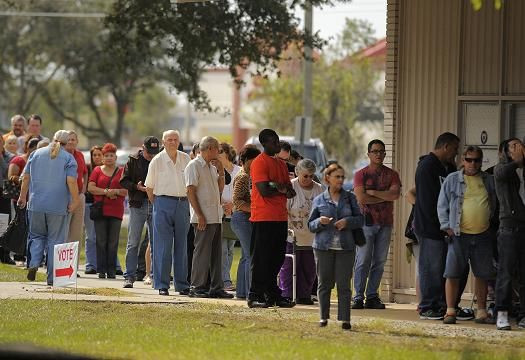Florida Election Results: Delay Is No Accident

Messy elections in Florida have a groan-inducing familiarity to them at this point. This year’s unfolding debacle even got an allusion -- and a roaring response -- in President Obama’s victory speech on Election Night.
“I want to thank every American who participated in this election, whether you voted for the very first time or waited in line for a very long time,” Obama said, his second term assured but Florida’s outcome still uncertain.
He paused for effect. “By the way, we have to fix that.”
It’s easy to laugh at Florida’s seemingly terminal inability to conduct a smooth election. But make no mistake: The delays, and the battles over absentee and provisional ballots, do not occur by accident. President Obama, whose Justice Department was kept busy this year challenging a raft of new state laws making it more difficult to vote, knows it.
Florida has attributed the difficulties this year to a late surge of more than 50,000 absentee ballots. But critics say that Florida's new voting law also played a role in disrupting the process and potentially deterring people from the polls.
That law, one of the toughest and most controversial in the nation, was one of many new voting restrictions put in place since 2010 by almost invariably Republican state legislatures. A federal judge blocked the Florida law's restrictions on voter registration in August, calling the new rules “harsh and impractical.”
Left in place was a provision cutting back the number of early voting days from 14 to eight, contributing to long waits -- as much as 6 or 7 hours in Miami Dade County and 3 to 4 hours elsewhere -- that Florida League of Women Voters President Deirdre Macnab called “unacceptable delays, worse than many third world countries.”
Voters in Florida also had to contend with the longest ballot in state history, a document that spans multiple pages. The new law also requires voters who move to a different county to obtain provisional ballots, which take longer to process.
The silver lining is that booming turnout has also contributed to lengthy lines. But Macnab noted that potential voters who had to work or care for their children were likely deterred by the long wait.
“Those people were really unfairly treated by these laws,” Macnab said.
That this election was decided without Florida is both a testament to the country’s shifting demographic map and a relief to anyone nervous about a disaster reminiscent of 2000. There is another parallel, though: The 2000 election was marred by revelations that a private firm tasked with removing ineligible felons from Florida’s voting rolls mistakenly disenfranchised legitimate voters.
Critics saw echoes of that in Florida Gov. Rick Scott’s push to purge ineligible noncitizens from the rolls. Sen. Ben Nelson, a Democrat, drew a comparison between the two in a letter to Scott and warned that “attempts to purge the voter roll so soon after signing one of the nation’s most controversial voting laws raises concern, especially among young and minority voters.”
County election supervisors balked when they received preliminary lists of ineligible voters that were riddled with errors. Legitimate voters identified as ineligible had become naturalized citizens, or were mistaken for someone else with a similar name. Florida suspended the purge until it got access to a federal database; ultimately, the number of names shrank from an ostensible 180,000 to around 200.
© Copyright IBTimes 2024. All rights reserved.





















